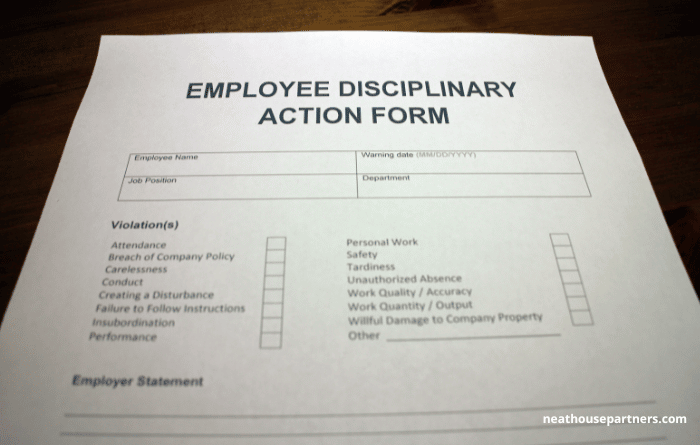Need to hold a disciplinary hearing and are wondering how much notice you need to give your employee?
A disciplinary hearing notice period isn’t set in stone by employment law but there must be a reasonable amount of time given between notifying an employee that they are required to attend a disciplinary meeting and the date set to hold the meeting to discuss their performance, behaviour or conduct.
The notice period is used to ensure that both employee and employer have sufficient time to prepare for the meeting.
Whilst what constitutes a reasonable amount of time for a disciplinary notice period will depend on the case in hand, five working days is generally seen as the recommended amount of time to allow although less notice may be reasonable in certain scenarios.
HR Support For Employers Managing Disciplinaries
Disciplinary matters at work can be stressful for both the employee at the centre of the investigation and the management team responsible for ensuring the disciplinary steps are carried out fully, fairly and in line with company procedure and recognised HR codes of practice.
Neathouse Partners can help support you with this by providing solution-driven outsourced HR support for employers.
If you need help with employee policies, staff handbooks, or managing difficult conversations including dismissal hearings following misconduct or poor performance from employees, then our experienced HR professionals and employment lawyers can help you expertly navigate HR matters like these with the sensitivity and proactiveness they deserve, regardless of how complex the issue may seem.
________________________________________________________
Need HR support that works for you?
Fill out our contact form or call us on 01244 893776
________________________________________________________
If you’re a business owner or manager looking for advice on the disciplinary hearing notice period, we cover everything you need to know in this article to ensure that you understand the correct steps to follow when notifying an employee that they will need to attend a disciplinary meeting following poor performance, misconduct or unacceptable behaviour at your place of work.
What Is A Notice Period?
In this context, a disciplinary notice period is the time between an employee being notified that they will be required to attend a disciplinary hearing and the date that the disciplinary hearing meeting is scheduled to take place.
Notifying an employee of an upcoming meeting of this nature should always follow informal measures to address the issue and a full and fair investigation into the matter that has resulted in the need for disciplinary action to be taken.
How Long Should The Disciplinary Notice Period Be?
Your company should have a disciplinary procedure outlined in its staff handbook setting out the notice period that will be given before a disciplinary meeting to ensure a fair and consistent process is followed for all employees.
If no policy exists or advice on the notice period that should be issued isn’t available, then you must ensure that you give both yourself and the employee sufficient time to prepare in line with HR codes of practice.
What constitutes a reasonable time will depend on the seriousness of the issue at hand and how much evidence or information there is to review before the meeting.
As a general rule of thumb, five working days should be acceptable and sufficient for most scenarios but if either side wants to extend or shorten this notice period by mutual agreement then this is perfectly acceptable too.
48 hours’ notice is probably the bare minimum but we would advise giving more notice if at all possible as insufficient notice could affect the fairness of a subsequent dismissal.
Before You Get To A Hearing
To reach a formal disciplinary hearing or meeting, you should have exhausted informal ways of resolving the employee behaviour issues such as having a discussion, listening to any reasons given for the behaviours shown, agreeing on an improvement plan or setting up training and development opportunities if the issue is related to a workers performance at work.
Examples of performance or behaviours that would warrant investigation may include but are not limited to:
- Consistently missing production or sales targets
- Failing to attend mandatory meetings
- Bullying, harassment, taking leave without permission or refusing to do work
More serious matters that would fall under the category of gross misconduct should still follow the disciplinary process set, but the result may end up being that the employee is dismissed without notice or providing payment instead of notice.
Examples of when this might be appropriate are fraudulent activities, gross negligence leading to injury of other people or equipment or physical violence.
If, after you have concluded the investigation, you have decided there is a case to answer to, then you can set a date for a disciplinary hearing ensuring that you provide enough notice for both parties to prepare.
What Preparation Is Needed?
The reasonable time needed to prepare should ensure that there is enough time for either side to review any documentation relating to the cause of the disciplinary meeting and ask any questions they may have as a result.
As the employer, you should ensure that your employee has a copy of the following information in writing before the disciplinary hearing takes place to allow for this to happen:
- the alleged misconduct or performance issue
- any evidence from the investigation
- any other information you or the employee may wish to discuss
- the date, time and location of the hearing
- information on the employee’s right to be accompanied to the hearing
- the possible outcomes
Outcomes Of A Disciplinary Hearing
The outcome of a disciplinary hearing will depend on several things including;
- the discussions held in the meeting
- the seriousness of the misconduct or performance issue involved
- if any contractual obligations have been breached,
- the precedence for handling matters of this nature in the past at your organisation.
Possible outcomes include:
- First written warning
- Final written warning
- Demotion or reassignment of duties
- Contractual sanction
- Dismissal
Summary
When managing misconduct, performance or behaviour issues at work, employers must follow a full and fair procedure.
When informal actions haven’t resolved the problem, you will need to take formal disciplinary steps following a full investigation into the problem at hand. Following a proper employment code of conduct minimises your chance of employment tribunals or claims of discrimination or unfair dismissal if dismissal is the eventual outcome.
Part of this full and fair procedure is to ensure employees are notified in writing of the need to attend a meeting to discuss their behaviour. This should be issued with a reasonable disciplinary hearing notice period, ideally of five working days or more, but in all cases, at least 48 hours’ notice.






